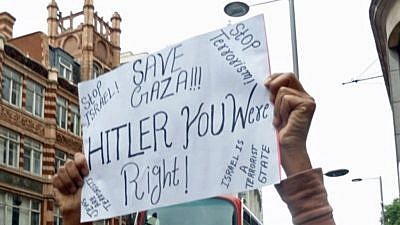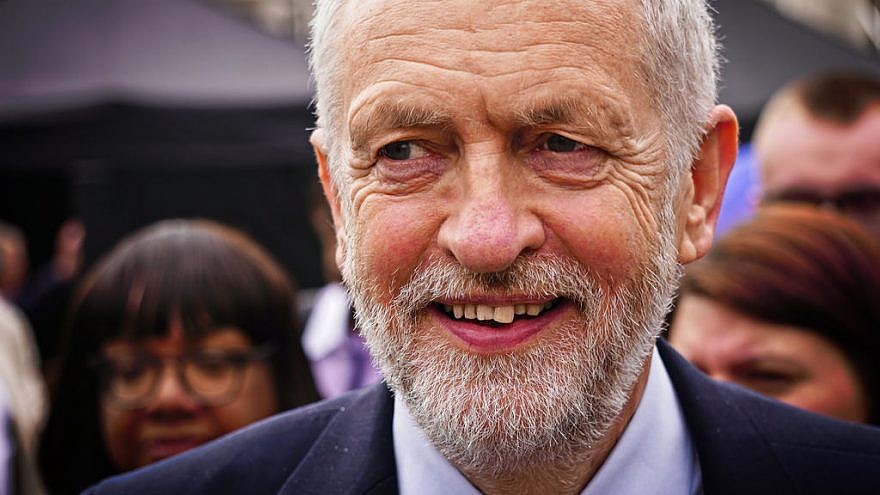A lecture hosted by the Committee for Accuracy in Middle East Reporting in America (CAMERA) on Sunday evening in Tel Aviv featured a panel of experts who warned about growing anti-Semitism in the United Kingdom and the threat that Labour Party leader Jeremy Corbyn poses if he were to become prime minister.
Corbyn, who has been associated with anti-Semitic language and behavior for years, has been encouraged by a rising tide of anti-Israel fervor throughout Western Europe.

“It didn’t start with Jeremy Corbyn, and it certainly won’t end with him,” British journalist Melanie Phillips, who is a columnist for JNS, said at the talk, which was titled “British Anti-Semitism: It’s Personal.”
“In Britain, Zionism, Judaism and anti-Semitism are not understood; there is no understanding that anti-Semitism is not just another prejudice. It is unique,” she continued. “The animosity against Israel is not criticism of Israel. It has all the characteristics of Jew-hatred throughout the centuries.”
It is a hatred coming from all directions, Phillips argued—the left, the right and the Muslim population in Britain. It doesn’t help, she added, that the left considers itself a bastion of advocating for human rights and tolerance, but is blind to its own biases against Jews.
“Many people in the Labour Party simply think it is against nature that you can be an anti-Semite on the left. They see it as an aberration because to be left-wing is to be anti-racist and can be found only on the right. This is simply not true,” she claimed.
Phillips delivered her comments to a sold-out audience in Tel Aviv’s Museum of the Jewish People at Beit Hatfutsot. The lecture, which was co-sponsored by UK Lawyers for Israel, IBCA-Israel, Britain and the Commonwealth Association and the Israel-Britain Chamber of Commerce, featured experts who issued a harsh warning that Britain’s anti-Semitism problem is real and troubling.
“The packed house here tonight underscores the sense of urgency felt by English-speaking immigrants in Israel to support the beleaguered British Jewish community and to stand up against anti-Semitism,” said Tamar Sternthal, director of CAMERA’s Israel office.
That urgency can be seen in sheer numbers. The Community Security Trust, a London-based nonprofit dedicated to protecting Jews in the United Kingdom, announced a record high of 1,652 anti-Semitic incidents in 2018—an increase of 16 percent over the previous year.
Moreover, according to the annual Antisemitism Barometer study by the Campaign Against Antisemitism, a nonprofit organization that fights anti-Semitism, 82 percent of the 2,103 respondents said politicians were “doing too little to fight anti-Semitism,” and 84 percent blamed the uptick in anti-Semitism on “recent political events.”
Just 22 percent of British Jews say they currently feel welcome in Great Britain, and 49 percent believe that Jews have a long-term future in the United Kingdom, a decrease from 59 percent in 2017 and 62 percent in 2016, which is when the Labour Party’s anti-Semitism crisis surfaced.
Growing tensions on college campuses
The night also addressed the issue of advocating for Israel on campuses in England and Scotland, an objective that has become an uphill battle.
“At the top universities in Britain, students with anti-Zionist views control the student unions and wrongfully use them as a vehicle for political activism with the aim of destroying the State of Israel,” warned Tamara Berens, a UK Campus Associate with CAMERA.
Berens said these students have a “fundamental problem with Jewish self-determination” and aim to isolate pro-Israel advocates on campus.
Ultimately, the talk served as a call to action for the English-speaking audience in the room to do what they can to support the embattled Jewish community.
“We Anglo Jews living in Israel and elsewhere resolve to make our voices heard, along with those of British Jews living in the U.K., to protest and speak out against anti-Semitism when it rears its head in politics, media or on campuses. Our voices matter, and our letters—to politicians, to media outlets, and to campus administrators—are counted and do make a difference,” Sternthal wrote in an email to CAMERA donors after the event.


























